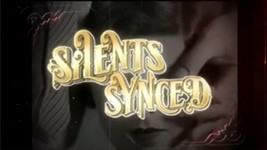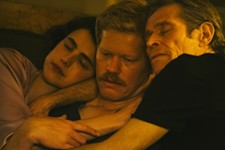Luke Wilson Plays a Long and Lonely Game in 12 Mighty Orphans
The story behind the period drama about Texas' most unlikely high school football heroes
By Richard Whittaker, Fri., June 11, 2021

Before Luke Wilson sat down to read the script for true-life Great Depression sporting biopic 12 Mighty Orphans, he'd never heard of Rusty Russell. "Somehow the story slipped past me," he said, "and maybe it was helpful to me in portraying Rusty that I didn't know much about him."
Harvey Nual "Rusty" Russell knew hard times. An orphan who lost his brother and some of his sight in World War I, he overcame those obstacles to become assistant head coach for Temple High School – a great position with real prospects. Then in 1927 he walked away and became head coach at Fort Worth Masonic Home, an orphanage that barely paid a salary, didn't have a real team, and where the field was a literal field, cows and all. Over the next 15 years, Russell led his players – some orphans, some abandoned by poverty-stricken parents – to state playoffs 10 times, and changed the lives of dozens of teens who otherwise would have been left to fend for themselves. Wilson said, "You hear about these college and pro-coaches, and what they're making, and they get fired and get a $4 million severance package. I don't think you get a lot of people like Rusty who was at a more prestigious school in Tyler, Texas, and he left that to go to this orphanage in Ft. Worth with his wife and small child."
Why would he do that? The star of Idiocracy and Enlightened studied the script and read Jim Dent's 2008 New York Times bestseller from which it was adapted for clues, but it was in spending time with Russell's grandson that he gained the deepest personal insight. "He spoke so highly of his grandfather, and what a gentle, nice guy he was." His anecdotes reminded Wilson of old men he'd known growing up in Dallas in the Seventies and Eighties, "those stoic, gentle, kindhearted souls, those rancher types who lived outside the cities. ... He was from that era when he didn't talk about your feelings or your hardships."
It wasn't just Russell's story that resonated with scriptwriter Lane Garrison, but also those of his students. After the success of their Texas oil epic The Iron Orchard (see "Iron Orchard Gets Its Day on Screen," Screens, Oct. 26, 2018), he, director Ty Roberts, and producer Houston Hill were looking for another project together. "Houston calls me up one day and says, 'I got the rights to this book, have you heard the story?'" He convinced the Georgetown resident to read Dent's book, and it immediately resonated with his own life: raised in Dallas, a footballer in school, and orphaned as a teen. Immediately, he and Roberts headed to Austin, "rented this tiny little office in a guest house off of Barton Creek," and started writing the script.
There had been other attempts to adapt Dent's book since its first publication in 2008, but Roberts was no stranger to cracking tough nuts (The Iron Orchard had five decades of failed film versions, with everyone from Paul Newman to Clint Eastwood signed on at some point). Quickly, the duo realized those earlier scripts failed because they concentrated on the sports side. "This is not a football movie," he said. "This is an 'overcoming the odds when your back's against the wall' movie. This is an inspiration for people who had nothing. Football was just the means to teach the lesson."
Garrison (who also stars as Rusty's coaching nemesis, Luther Scarborough – per Garrison, "a real nasty bugger") wasn't afraid to channel his own experiences into the script. "I know who these kids are," he said. "There's a scene that talks about hurt and loss and abandonment, and that's something I felt in my life, losing both my parents and trying to fill that hole. And it was a lot harder back then. If you were an orphan, you were an outcast, you were a convict, you were unloved."
For Wilson, the script carried a particular challenge: playing a taciturn character. "I don't want to be doing nothing," he said. "I know what I'm doing, I know what I'm thinking, but I don't want it to come across as a guy just standing there." However, on set he found himself as the calm center at the maelstrom of the young actors – many of them first timers – who played the Mighty Mites. He admitted he was initially worried that he'd be working with "TikTok actors from L.A.," but instead he found how committed Russell and Garrison were to period authenticity. "All those kids' faces were so great," said Wilson, "like Jacob Lofland, he looks like a Dustbowl-era kid." Wilson soon found himself taking a paternal role on set. "They were like a pack of puppies or wolves, where they all moved around together, and if you talked to one of them you were talking to all of them. ... It reminded me of me and my brothers and Wes Anderson making our first movie [Bottle Rocket]. The crew people were so nice to us, and so patient, and just very sweet with us. Not only were we in over our heads, we didn't really know what we were doing."
There were so many little incremental details that helped form the character, and he had particular praise for the handmade, period-correct outfits by costume designer Juliana Hoffpauir that shaped how he walked and moved: "Even pulling your pants up to that height, because my inclination is to push them down around my hips [but] it was like putting on a uniform for sports. 'OK, back in it, time to go back to work. I've got his fedora on, I've got this coat and tie, let's get back to work.'"
The decision to film 12 Mighty Orphans on location in Ft. Worth, "hearing that accent every day," helped Wilson get into character, and there was the shooting at the Pythian Home in Weatherford. "It's not an orphanage," Wilson said, "but it's a place where people can leave their child while they get back on their feet." Opened in 1909, only 10 years after the Masonic Home, it's a building loaded with history. "If you're ever out there alone, and you're in one of those rooms or out on the Texas prairie, you can feel that past."
Garrison had a different but equally powerful emotional reaction. Location scouting at the Pythian Home, he was struck by an old memory: age 16, newly orphaned, and now separated from his sister when she was taken to the Buckner Children's Home in Dallas. "Seeing this little classroom, everything came back to me, and man, it just poured right through me. It was therapeutic for me." It also brought him even closer to Russell's Mighty Mites: "When you lose your parents as a young man or woman, it leaves a hole that feels like will never be filled. In going through the book and writing the script, you realize: You're not alone."
12 Mighty Orphans opens in Texas this week and expands nationally on June 18.








